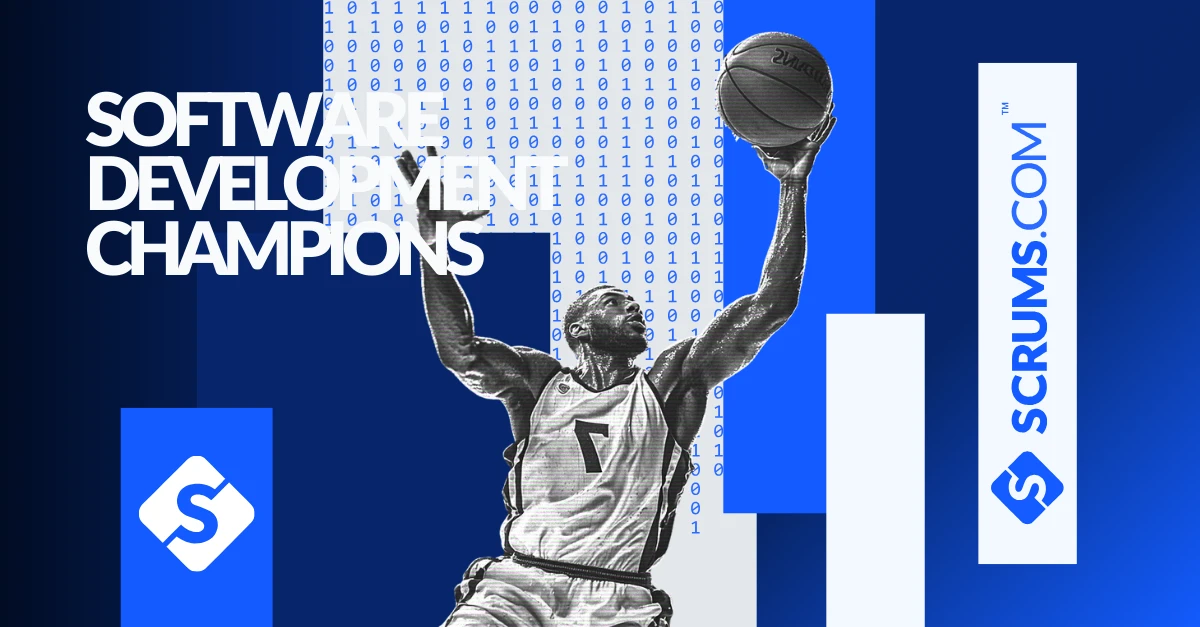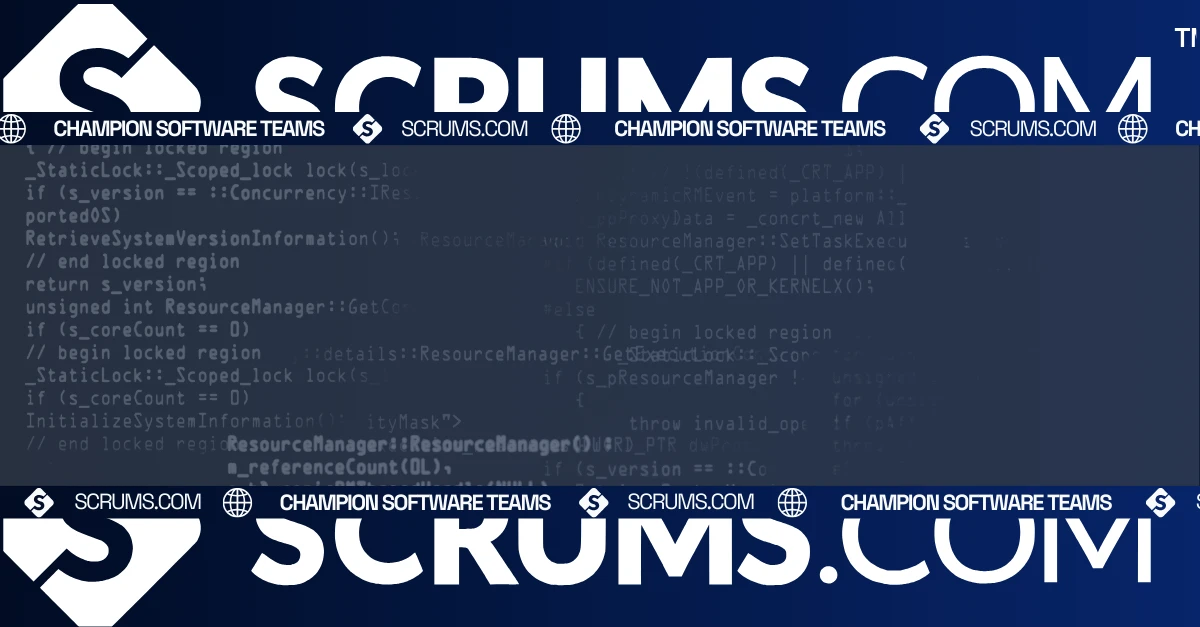Custom software development company in Denmark
Build AI-powered custom software solutions with Scrums.com's Software Engineering Orchestration Platform (SEOP). With a remarkable Net Promoter Score (NPS) of 82, Scrums.com crafts cost-effective, scalable software that drives results.
Software Development in Denmark
Denmark, known for its progressive approach to technology and innovation, is rapidly becoming a hub for software development in Northern Europe. The country's tech ecosystem is thriving, supported by government initiatives, a strong emphasis on education, and a collaborative environment that fosters creativity and innovation. With a population of just over 5.8 million, Denmark has positioned itself as a leader in digital transformation, particularly in areas such as fintech, healthtech, and green tech.
The Danish government’s focus on digitalization has created a fertile ground for software development. Initiatives like the Digital Strategy 2025 aim to ensure that Denmark remains at the forefront of technological advancement. This strategy emphasizes the importance of digital growth, cybersecurity, and the use of technology to improve public services, making Denmark a prime location for custom software development.
Why Denmark Needs Custom Software Development
Custom software development is crucial for Denmark as it continues to evolve into a global tech powerhouse. The country’s diverse industries, from pharmaceuticals and renewable energy to finance and logistics, require tailored software solutions to maintain their competitive edge. Custom software enables businesses to address specific challenges, optimize operations, and enhance customer experiences in a way that off-the-shelf solutions cannot.
Denmark’s booming fintech industry, for example, benefits immensely from custom software development. With Copenhagen recognized as a leading fintech hub in Europe, businesses are increasingly seeking bespoke software to manage complex financial transactions, enhance security, and comply with stringent regulatory requirements.
Moreover, Denmark’s strong focus on sustainability has led to the growth of the green tech industry, which relies heavily on custom software to manage renewable energy sources, reduce emissions, and optimize energy consumption. As Denmark continues to prioritize green initiatives, the need for custom software development will only increase, ensuring that businesses can innovate and lead in a rapidly changing market.
How Technology is Affecting Denmark
Technology is deeply embedded in Danish society, influencing everything from healthcare and education to finance and public administration. Denmark ranks among the top countries globally for digital adoption, with 98% of its population having access to the internet and a strong culture of embracing new technologies.
In the healthcare sector, for instance, Denmark has implemented advanced digital health solutions that allow for better patient management, remote consultations, and efficient data sharing. The country’s electronic health record system, Sundhedsplatformen, is a prime example of how technology is transforming healthcare, making it more efficient and accessible.
However, the rapid advancement of technology also presents challenges. Denmark faces the task of ensuring that its digital infrastructure remains secure and resilient against cyber threats. As cybercrime becomes more sophisticated, the demand for advanced cybersecurity solutions and custom software that can protect sensitive data is growing.
Technology Trends Shaping Denmark
Several technology trends are shaping the future of Denmark, particularly in the realm of custom software development. One of the most significant trends is the rise of artificial intelligence (AI) and machine learning (ML). Danish companies are increasingly integrating AI and ML into their software solutions to automate processes, improve decision-making, and enhance customer experiences. For example, AI-driven chatbots are becoming commonplace in Danish customer service, providing instant support and improving efficiency.
Another key trend is the adoption of cloud computing. Denmark’s businesses are rapidly moving to the cloud, leveraging its scalability, flexibility, and cost-effectiveness. This shift is driving demand for custom cloud-based applications that can be tailored to specific business needs, offering improved data management and collaboration.
The Internet of Things (IoT) is also gaining traction in Denmark, particularly in the green tech and smart city sectors. Custom software solutions are essential for managing IoT devices, analyzing the vast amounts of data they generate, and ensuring that these devices are secure and reliable.
What are the Tech Stacks?
In Denmark, several tech stacks have become particularly popular among developers and businesses. The MERN stack (MongoDB, Express.js, React, Node.js) is widely used for web development due to its versatility and efficiency. Additionally, the LAMP stack (Linux, Apache, MySQL, PHP) remains a staple for many Danish companies, especially those with legacy systems that require stable and reliable software solutions.
For mobile development, Flutter and React Native are the frameworks of choice, allowing developers to create high-quality cross-platform applications that cater to both Android and iOS users. In the realm of cloud computing, AWS, Microsoft Azure, and Google Cloud are the dominant platforms, with Danish companies increasingly adopting these services for their scalability and robust infrastructure.
The Advantages of the Tech Stacks
The tech stacks popular in Denmark offer several advantages that align with the country’s emphasis on innovation and efficiency. The MERN stack, for example, allows for rapid development cycles, making it ideal for Denmark’s fast-paced startup environment. Its use of JavaScript throughout the stack also simplifies development and enhances the performance of web applications, which is crucial for businesses aiming to deliver seamless user experiences.
The LAMP stack, known for its stability and security, is particularly advantageous for businesses with established systems that require reliable software solutions. Its open-source nature also aligns with Denmark’s culture of collaboration and knowledge sharing within the tech community.
Mobile frameworks like Flutter and React Native offer the advantage of cross-platform compatibility, reducing development time and costs while ensuring a consistent user experience across devices. This is particularly beneficial in Denmark, where businesses prioritize efficiency and innovation.
Industries Benefiting from Custom Software Development in Denmark
Several industries in Denmark are reaping the benefits of custom software development, each leveraging technology to drive growth and innovation. The financial sector, particularly fintech, is at the forefront, with custom software solutions enabling companies to offer innovative financial products, enhance security, and comply with complex regulations.
The healthcare industry is another significant beneficiary, with custom software playing a critical role in managing patient data, streamlining operations, and improving patient outcomes. As Denmark continues to lead in digital health, the demand for bespoke software solutions in this sector is expected to grow.
Denmark’s green tech industry is also heavily reliant on custom software to manage renewable energy projects, optimize energy consumption, and reduce emissions. As the country strives to achieve its ambitious sustainability goals, the role of custom software development in supporting green initiatives cannot be overstated.
Service Offerings by Scrums.com
Scrums.com offers a comprehensive range of software development services tailored to meet the diverse needs of businesses in Denmark:
- Custom Software Development: We build bespoke software solutions tailored to your specific business needs, ensuring a perfect fit for your operations and objectives.
- Mobile App Development: Our team specializes in creating high-performance mobile applications for both Android and iOS platforms, leveraging the latest technologies to deliver exceptional user experiences.
- Web Development: We design and develop robust, scalable web applications using modern tech stacks like MERN, MEAN, and LAMP, ensuring seamless performance and functionality.
- Cloud Solutions: Our cloud development services include building scalable, secure, and efficient cloud-based applications that enhance accessibility and collaboration.
- AI and Machine Learning: We integrate AI and ML capabilities into your software to provide intelligent, adaptive solutions that drive innovation and improve efficiency.
- Software Developer Analytics: We leverage data analytics to provide insights into software performance, user behavior, and development processes, enabling data-driven decision-making and continuous improvement.
- Staff Augmentation Services: Our staff augmentation services provide you with experienced software developers who seamlessly integrate with your team, helping to meet project deadlines and enhance your development capabilities.
- Software Maintenance and Support: We offer ongoing maintenance and support to ensure your software remains secure, up-to-date, and performs optimally.
Partner with Scrums.com for Your Software Development NeedsScrums.com is a leading custom software development company that combines global expertise with innovative solutions to deliver powerful software that meets your unique business needs. Whether you are looking to develop a web application, a mobile app, or an enterprise solution, our team of skilled developers and engineers is here to help you every step of the way. Contact us today to discuss how we can help you achieve your goals with our comprehensive software development services.
Don't Just Take Our Word for It
Hear from some of our amazing customers who are building with Scrums.com Teams.
Find Related Software Development Company Locations
Software Development Germany
Software Development Netherlands
Software Development Belgium
Software Development Amsterdam
Software Development Berlin
Software Development Stockholm
How to Hire Scrums.com for Custom Software Development
Align
Let us get to know your business. Book a free consultation and tell us about your requirements and software development project details.
About Us
We will discuss Scrums.com, our processes and how our our hiring process and subscriptions work.
Next Steps
We will discuss Scrums.com's custom development solutions and how we can best solve your current business problem.
Kick-Off
Once we have agreed on the best way forward, we will start the contract closure process. Once that's done - We can kick-off!
Explore Software Development Blogs
The most recent trends and insights to expand your software development knowledge.















